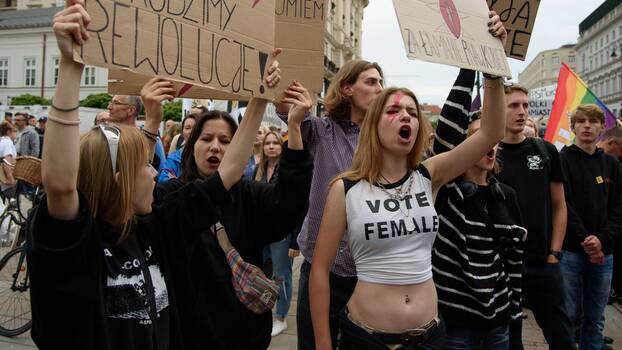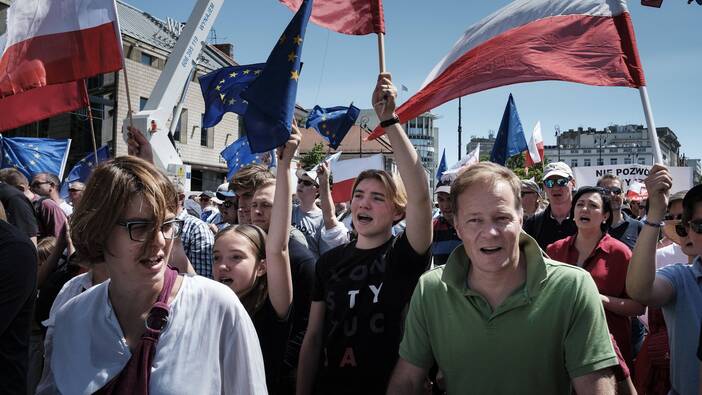
According to a survey conducted in May by the NGO More in Common, almost half (47 percent) of young women in Poland do not yet know for whom they will vote, while 75 percent of those surveyed in this age group (18 to 29 years old) are convinced that “Poland is going in the wrong direction”.
Zuzanna Dąbrowska was active in the democratic opposition in the 1980s. She currently writes for the Polish daily Rzeczpospolita.
The survey has had a significant impact on Polish politicians as they begin campaigning for the parliamentary elections that are to be held on 15 October. The results of the survey are particularly important for the opposition, because if young women see the government’s policies as “going in the wrong direction”, they are unlikely to vote for the ruling party. However, it is uncertain whether they will even decide to participate in the elections and vote for the opposition.
By opposition, I am referring to the three parties, or rather electoral alliances of parties, that call themselves the “democratic opposition”: the Civic Coalition (comprising the liberal Civic Platform and its smaller centre-left allies), the Left (mainly the social democratic New Left and the progressive party Together), and the centre-right Third Way party (Polish People’s Party and Poland 2050). These parties are united by their resistance to the current nationalist-conservative government of Law and Justice (Prawo i Sprawiedliwość, or PiS) and by their desire to form a joint government after the elections.
The Defeat of the Women’s Strike
After the ruling by the government-controlled Constitutional Court on the tightening of the anti-abortion law, which removed the possibility of termination due to an expected “severe and irreversible foetal defect”, mass protests erupted across Poland in 2020, organized as part of the women’s strike across the entire country, including in small county towns. This was the largest mobilization of women, especially young women, to have taken place in Poland since 1989.
Politicians from the anti-PiS camp also participated in these protests, some of them as co-organizers. However, it is largely forgotten that the first protest in front of the Constitutional Tribunal was organized by the smaller left-wing party Together. As the protests grew, activists associated with the Women’s Strike took the initiative, and political parties that wanted to increase the movement’s chances withdrew. During many months, it seemed as if, for the first time in Poland’s history, a radical autonomous self-organization of rebellious female voters would emerge, which, in turn, would strengthen the political opposition.
However, this did not materialize. The strike leaders could not withstand the political pressure and failed in the challenge of establishing cross-party political representation. Opposition party leaders found this regrettable, but were also relieved — no serious competition had emerged on the political map.
Only Mobilization Can Help
Today, the female electorate is disheartened and frustrated. Mass protest in the streets did not lead to these draconian laws being changed — why would electoral participation work? Some women activists nonetheless decided to enter politics and join the opposition parties.
All parties are competing for votes from female voters aged 18 to 59, although PiS is apparently the least dedicated in this respect. Perhaps they know that it is a battle they are bound to lose.
However, the unfavourable trend described in the More in Common survey has not been reversed. The older the polled women are, the greater their political engagement and willingness to participate in the election — by voting for the ruling PiS party. This could mean that after the elections we find out that the fate of Poland’s 18-year-olds has been decided by women (and, of course, men) over the age of 60.
The only way to reverse this process is through mobilization. All of the parties are trying. But according to the polls, the two largest parties — PiS and the Civic Coalition — have already garnered all the support they can muster.
Will the Elections Hinge on Female Voters Aged 18 to 59?
All parties are competing for votes from female voters aged 18 to 59, although PiS is apparently the least dedicated in this respect. Perhaps they know that it is a battle they are bound to lose. All the more so given party chief Jarosław Kaczyński’s misogynistic remark about alcohol use among women under 25 affecting the birthrate, which was widely condemned.
How is the opposition tackling the challenge of mobilization? The opposition parties have learned some clear lessons. Mechanisms were implemented on the lists for the elections to the Sejm, the Polish parliament: the zipper system was used to increase the percentage of female candidates, and many top positions on the regional election lists went to women.
However, there were also some slip-ups: for example, at the press conference to present the Senate pact which the opposition had painstakingly negotiated (an agreement to put forward a common candidate for the Senate — the second chamber of the Polish parliament — in each single-member constituency), only male representatives of the parties were present. Apparently, the party leaders forgot about their female colleagues. Of all days, this happened at the first press conference where the opposition parties were able to announce complete agreement on any issue.
The opposition parties present a wide-ranging policy platform — for example, the Civic Coalition agrees with the New Left on the issue of abortion (allowing abortion up to the twelfth week of pregnancy without the need for specifying reasons). The Third Way, however, calls for a referendum on this issue. All three parties demand state funding for in-vitro fertilization procedures and advocate various social policies aimed at women: the Left party for widows’ pensions, the Civic Coalition for financial support for women re-entering the labour market so that they can afford childcare, and the Third Way for equal pay for women and men as well as investments in kindergartens.
There are also many initiatives aimed at bolstering their appearance of being committed to women’s issues. Women are prominently featured at all press conferences and election campaign events, and there are dedicated “Women Power” gatherings focused on addressing women's needs. There has never been such a strong presence of women in the political arena.
However, the opposition has to ask itself whether all this is enough to motivate the women of Poland to participate in the election. Because if they stay home on election day, Jarosław Kaczyński will be serving a third term in office.
Translated by Diego Otero and Samuel Langer for Gegensatz Translation Collective.
